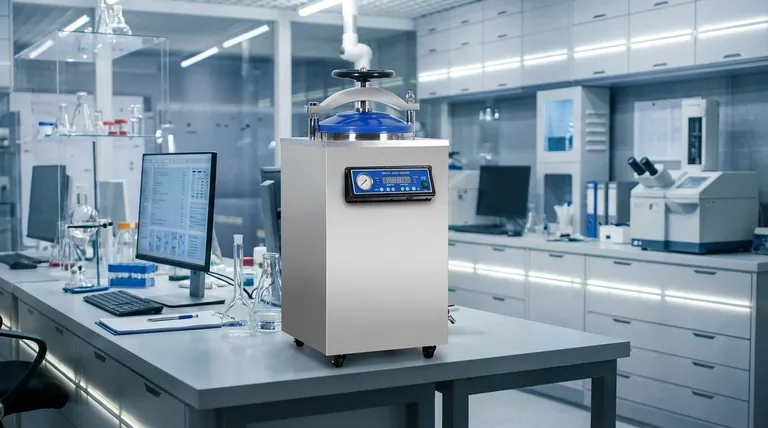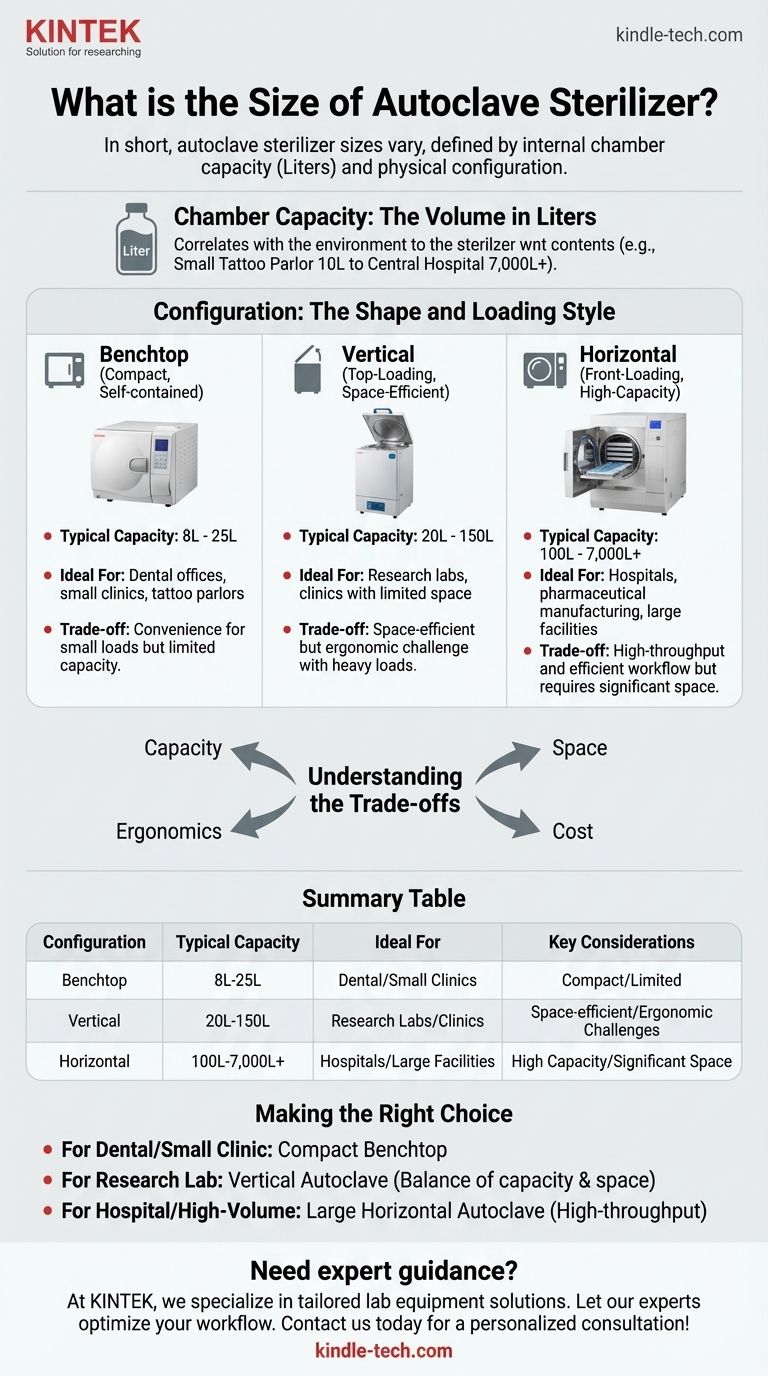In short, autoclave sterilizer sizes are not standardized but are categorized by their internal chamber capacity, measured in liters, and their physical configuration. Sizes range from small benchtop units under 25 liters, suitable for dental offices, to massive horizontal machines exceeding 7,000 liters, designed for large hospitals.
The most critical factor is not the absolute size, but how the autoclave's configuration—benchtop, vertical, or horizontal—aligns with your specific workflow, the items you need to sterilize, and your available space.

How Autoclave Size and Type Are Defined
An autoclave's "size" is a function of its internal chamber volume and its physical orientation. Understanding both is essential to selecting the right machine.
Chamber Capacity: The Volume in Liters
The primary measure of an autoclave's size is the volume of its sterilization chamber, expressed in liters (L). This tells you how much material you can sterilize in a single cycle.
This capacity directly correlates with the types of environments the autoclave is designed for. A small tattoo parlor may only need a 10L unit, while a central hospital sterilization department requires thousands of liters of capacity.
Configuration: The Shape and Loading Style
The physical design dictates how you interact with the machine and what it can efficiently sterilize. There are two primary floor-standing configurations, in addition to smaller benchtop models.
Vertical Autoclaves: Top-Loading and Space-Efficient
As the name implies, these units are loaded from the top. The lid opens upwards, revealing a deep chamber.
They are generally considered small-to-medium capacity, typically ranging from 20L to 150L. Their smaller footprint makes them ideal for research labs or clinics with limited floor space.
Horizontal Autoclaves: Front-Loading and High-Capacity
These autoclaves operate like a large front-loading washing machine. The door swings outward, allowing users to slide trays or roll carts directly into the chamber.
This design is standard for large-capacity machines, from around 100L to over 7,000L. They are the workhorses of hospitals, pharmaceutical manufacturing, and large-scale research facilities.
Understanding the Trade-offs
Choosing a size and configuration involves balancing capacity, space, ergonomics, and cost. Each design comes with inherent compromises.
The Vertical Autoclave Dilemma
Vertical autoclaves are excellent for sterilizing tall items like flasks, fermenters, and media bottles. Their small footprint is a significant advantage in crowded labs.
However, they present an ergonomic challenge. Lifting heavy baskets of glassware or biohazard bags out of a hot, deep chamber can be difficult and increases the risk of injury or spillage.
The Horizontal Autoclave Dilemma
Horizontal autoclaves are unmatched for high-throughput sterilization. Loading and unloading with trolleys is efficient and safe for heavy or bulky items like surgical kits and large waste bags.
The clear downside is their physical footprint. These are large, heavy machines that require significant dedicated floor space and often complex utility connections for steam, water, and drainage.
The Benchtop Model Compromise
Small, self-contained benchtop or tabletop autoclaves (typically 8L to 25L) are a third category. They offer convenience for small practices like dental or veterinary clinics.
Their limitation is obvious: capacity. They are completely unsuitable for anything beyond small, wrapped instrument kits or loose tools.
Making the Right Choice for Your Goal
To select the correct autoclave, match its size and configuration to your primary sterilization needs.
- If your primary focus is a dental office, tattoo parlor, or small clinic: A compact benchtop autoclave offers the most practical and cost-effective solution for small instrument loads.
- If your primary focus is a research lab sterilizing media and glassware: A vertical autoclave provides the ideal balance of capacity for tall items and efficient use of floor space.
- If your primary focus is a hospital or high-volume facility: A large-capacity horizontal autoclave is the only choice that supports a safe, efficient, and high-throughput workflow.
Ultimately, selecting the right autoclave is about ensuring your sterilization capacity and workflow match your operational demands.
Summary Table:
| Configuration | Typical Capacity | Ideal For | Key Considerations |
|---|---|---|---|
| Benchtop | 8L - 25L | Dental offices, small clinics, tattoo parlors | Compact, convenient, limited capacity |
| Vertical (Top-Loading) | 20L - 150L | Research labs, clinics with limited space | Space-efficient, ergonomic challenges with heavy loads |
| Horizontal (Front-Loading) | 100L - 7,000L+ | Hospitals, pharmaceutical manufacturing, large facilities | High capacity, efficient workflow, requires significant space |
Need expert guidance to select the perfect autoclave for your laboratory? At KINTEK, we specialize in providing lab equipment solutions tailored to your specific needs. Whether you're a small clinic or a large hospital, our range of autoclaves ensures efficient and reliable sterilization. Let our experts help you optimize your workflow and maximize your investment. Contact us today for a personalized consultation!
Visual Guide

Related Products
- Laboratory High Pressure Steam Sterilizer Vertical Autoclave for Lab Department
- Portable High Pressure Laboratory Autoclave Steam Sterilizer for Lab Use
- Portable Digital Display Automatic Laboratory Sterilizer Lab Autoclave for Sterilization Pressure
- Desktop Fast Laboratory Autoclave Sterilizer 35L 50L 90L for Lab Use
- Desktop Fast Laboratory Autoclave Sterilizer 20L 24L for Lab Use
People Also Ask
- Which factors contribute to successful sterilization using an autoclave? Master the 3 Keys to Sterility
- Why are HPHT Autoclaves required for hydrogen transport simulation? Ensure Industrial Reliability & Compliance
- What Cannot be sterilized in an autoclave? Protect Your Lab from Heat and Moisture Damage
- What are the standard conditions for sterilization of equipment contaminated with blood by autoclaving? Ensure Complete Sterility & Safety
- Why is autoclave pressure 15 psi? The Key to Achieving Sterilizing Temperatures
- What is autoclaving sterilization summary? A Complete Guide to Steam Sterilization
- Why are hydrothermal synthesis autoclaves used for mesoporous HA catalysts? Engineering Superior Catalytic Efficiency
- What materials are used in sterilization? Match the Right Method to Your Lab Equipment



















